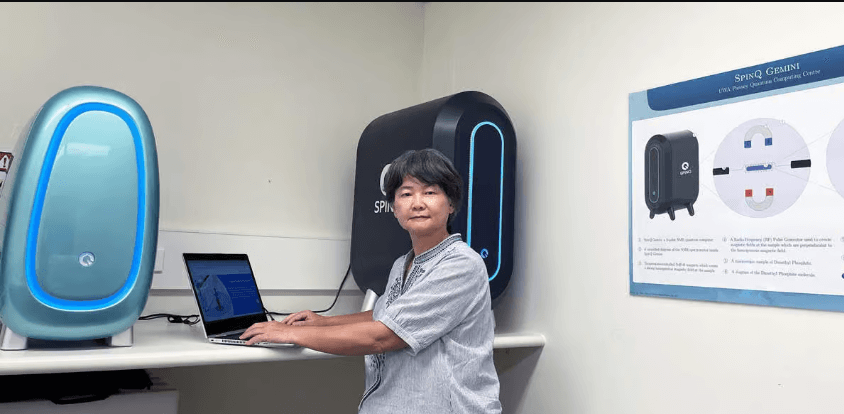How Quantum Computing is Shaping the Future
Introduction
Quantum computing is one of the most fascinating and rapidly evolving fields in modern technology. Unlike classical computers, which process information as binary “bits” (0s and 1s), quantum computers use quantum bits or qubits, which have the unique ability to exist in multiple states simultaneously. This ability allows quantum computers to solve complex problems much faster and more efficiently than their classical counterparts. While still in its early stages, quantum computing is poised to revolutionize industries such as healthcare, finance, logistics, and artificial intelligence. In this article, we will explore what quantum computing is, how it works, its potential applications, and its implications for the future.
What is Quantum Computing?
Quantum computing is based on the principles of quantum mechanics, a branch of physics that deals with the behavior of matter and energy at the smallest scales—atomic and subatomic levels. In classical computing, information is processed using binary bits, where each bit is either a 0 or a 1. However, in quantum computing, qubits are used, which can represent both 0 and 1 at the same time, thanks to a property called superposition.
Additionally, qubits can be entangled, meaning the state of one qubit can depend on the state of another, even if they are far apart. This phenomenon is known as quantum entanglement, and it allows quantum computers to perform multiple calculations simultaneously, exponentially increasing their processing power.
How Does Quantum Computing Work?
The power of quantum computing comes from the manipulation of qubits using quantum gates. These gates are the quantum equivalent of the logic gates used in classical computers. Quantum gates control qubits by changing their state, performing operations on them to solve specific problems. A quantum computer runs algorithms that take advantage of superposition and entanglement to explore many possible solutions at once, rather than processing each solution sequentially like a classical computer.
Quantum computers also rely on quantum interference to amplify the correct answers while canceling out the wrong ones, allowing the computer to converge on the correct solution much faster than classical systems.
See also: How Quantum Computing is Shaping the Future
Key Features of Quantum Computing
Superposition
As mentioned earlier, superposition is the ability of a qubit to exist in multiple states simultaneously. This allows quantum computers to perform many calculations at once. For example, while a classical computer might need to test each possible solution to a problem one by one, a quantum computer can test all possibilities simultaneously, drastically reducing computation time.
Quantum Entanglement
Quantum entanglement is a phenomenon where the states of two or more qubits are correlated, meaning the state of one qubit will directly influence the state of another, regardless of distance. This allows quantum computers to process and transmit information in ways that classical computers cannot. Entanglement enables the parallelization of computations, making quantum computers extraordinarily powerful for certain tasks.
Quantum Interference
Quantum interference allows quantum computers to combine the probabilities of different outcomes in such a way that the most likely answers are amplified, and less likely answers are reduced. This helps the quantum computer converge on the correct solution with greater efficiency than classical algorithms.
Applications of Quantum Computing
Quantum computing is still in the research and development phase, but its potential applications are vast and far-reaching. Let’s explore some of the key areas where quantum computing is expected to have a profound impact:
Cryptography and Security
One of the most well-known potential applications of quantum computing is in the field of cryptography. Quantum computers could potentially break many of the encryption methods currently used to secure data, such as RSA and ECC (Elliptic Curve Cryptography), by solving complex mathematical problems much faster than classical computers.
However, quantum computing also holds the promise of creating new, more secure encryption methods based on the principles of quantum mechanics. Quantum key distribution (QKD) is one such example, allowing for secure communication that cannot be intercepted without detection.
Drug Discovery and Healthcare
Quantum computing has the potential to revolutionize drug discovery by simulating complex molecular structures and chemical reactions with unprecedented accuracy. Classical computers struggle to simulate large molecules due to the vast number of variables involved, but quantum computers can model these systems much more efficiently, opening the door to the rapid discovery of new drugs and therapies.
For example, quantum computers could be used to simulate the interaction between drugs and human proteins, enabling pharmaceutical companies to design more effective treatments with fewer side effects. Additionally, quantum computing could help model complex biological processes, accelerating research in areas like genetics, personalized medicine, and genomics.
Artificial Intelligence and Machine Learning
Machine learning and artificial intelligence (AI) are fields that can greatly benefit from quantum computing. Many machine learning algorithms require processing large amounts of data, which can be computationally expensive and time-consuming on classical computers. Quantum computing could significantly speed up the training of machine learning models, enabling more efficient AI development.
For example, quantum computers could accelerate optimization tasks, such as training neural networks, enhancing pattern recognition, and improving decision-making in AI applications. This could have major implications in industries like autonomous vehicles, robotics, and natural language processing.
Financial Modeling and Risk Analysis
The finance industry could also see significant benefits from quantum computing, particularly in the areas of financial modeling and risk analysis. Quantum computers can analyze large datasets with complex variables, enabling financial institutions to better predict market trends, optimize portfolios, and perform risk assessments.
Quantum computing could also be used for simulations and optimization in areas like pricing derivatives, detecting fraud, and managing financial risks. By providing more accurate models of financial systems, quantum computing could help businesses make better investment decisions and manage their portfolios more effectively.
Optimization Problems
Quantum computers are particularly well-suited to solving complex optimization problems, which involve finding the best solution from a set of possible options. This is relevant to a wide range of industries, including logistics, manufacturing, and transportation.
For instance, quantum computing could be used to optimize supply chain management, minimize production costs, or find the most efficient routes for delivery trucks. In sectors such as energy, quantum computing could optimize grid management and resource allocation, contributing to more sustainable and efficient operations.
Challenges and Limitations of Quantum Computing
While the potential of quantum computing is immense, there are still several challenges and limitations that need to be overcome before it becomes widely practical:
Quantum Decoherence
One of the major challenges in quantum computing is quantum decoherence, which occurs when qubits lose their quantum properties due to interference from their environment. This leads to errors in calculations and makes it difficult to maintain a stable quantum state over time. Researchers are working on developing methods to reduce decoherence, such as quantum error correction, but this remains a significant hurdle.
Hardware and Scalability
Building a quantum computer that can handle large-scale computations requires highly advanced hardware, such as superconducting qubits or trapped ions, which must be maintained at extremely low temperatures. Scaling up quantum computers to handle more qubits and perform more complex calculations is a major technical challenge, and current quantum computers are still relatively small and limited in capability.
Algorithm Development
Another challenge is the development of quantum algorithms that can fully take advantage of quantum computing’s potential. While there are some quantum algorithms, such as Shor’s algorithm for factoring large numbers and Grover’s algorithm for searching unsorted databases, many existing algorithms need to be adapted or redesigned to work on quantum computers.
The Future of Quantum Computing
As research and development in quantum computing continue to progress, we can expect several breakthroughs in the next few decades. Major technology companies such as IBM, Google, and Microsoft are heavily investing in quantum research, and quantum computers are likely to become more powerful, stable, and accessible as the field matures.
In the future, quantum computing could help solve some of the world’s most complex problems, including climate change, resource allocation, and advanced materials discovery. The impact of quantum computing on industries like healthcare, finance, and AI could be transformative, leading to faster innovation and more efficient solutions across the board.
Conclusion
Quantum computing represents a leap forward in the world of technology, offering the potential to solve problems that were previously thought to be beyond reach. While it is still in its infancy, the future of quantum computing is incredibly promising. As advancements continue, quantum computers will likely play a pivotal role in driving innovation and shaping the future of industries ranging from healthcare to finance and beyond.






